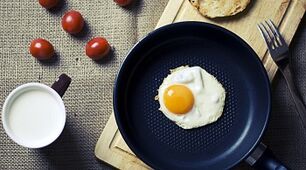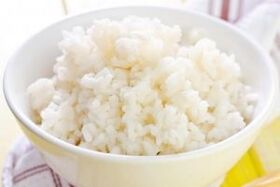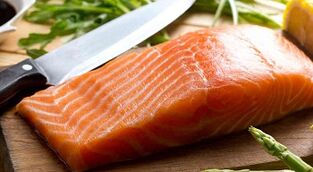
The rhythm of modern life does not allow most people to pay enough attention to their health. Fast food and synthetic food supplements cause stomach and digestive problems. Many people suffer from gastritis.
Pharmaceutical companies offer a wide range of drugs, but if you do not follow a proper diet for gastritis, this unpleasant disease will not go away.
Gastritis is an inflammation of the lining of the stomach. Occurs for many reasons:
- eating disorders, especially dry eating habits, excessive love of spicy foods, "hungry" diets;
- presence of poor quality products in the diet;
- bad habits;
- stress;
- long-term use of certain drugs;
- Presence of Helicobacter pylori bacteria in the stomach.
Gastritis manifests itself very clearly - heartburn, abdominal pain and heaviness, nausea, vomiting, fecal incontinence. It is difficult to get rid of the disease; a unified approach is needed. A proper diet for gastritis is important for your recovery. The choice of diet depends on the type of your disease. Distinguish gastritis:
- abrasive;
- atrophic;
- with increased or decreased acidity of the stomach;
- in acute and chronic form.
Diet for acute gastritis
This disease causes inflammation of the gastric mucosa, so it is recommended to fast. Ideally, you should completely give up eating and drinking on the first day by resting your digestive system. Always drink some hot water.
Cold and hot during contractions are contraindicated.

Then the diet should gradually include solutions based on a weak broth, oatmeal or rice grains. As a drink, it is better to offer the patient a mixture of weak tea, rose hips and chamomile.
Diet for acute gastritis can be extended for several days.
Recommended food:
- viscous soups;
- milk rice, semolina, oatmeal;
- steam omelets;
- soft-boiled egg;
- low-fat milk or skim milk;
- cottage cheese souffle;
- drinks: unsaturated compotes and jelly, weak tea with lemon or honey.
Once the symptoms of gastritis disappear, you can gradually return to your normal diet. Although beyond the period of violence, there are a number of products that are not suitable for people prone to inflammation of the lining of the stomach. Gastritis is a cunning disease that can return at any time.
During remission, spicy, fatty and fried foods, fresh fruits and vegetables, fizzy drinks, alcohol, brown should be strictly limited or completely abandoned.
Chicory, which has an effect on mucous membranes, can be compared to coffee, and it is better to avoid it. After suffering from acute gastritis, such a diet will help reduce the risk of a new attack.
Attention!Milk porridge or porridge on the water is a healthy breakfast, but avoid instant cereals or cereals that do not require boiling, they are not very useful and contain harmful additives to the weakened stomach. It is better to wipe the porridge additionally during periods of disease exacerbation.
Diet for chronic gastritis
Diet for chronic gastritis allows you to eat:
- milk porridge, well-cooked and sparse consistency;
- mashed soups or mashed vegetable soups;
- soft-boiled egg;
- steam omelets;
- dairy products and acid-free cottage cheese;
- well-cooked meat or fish.
What sweets can you eat with chronic gastritis? Sugar, marshmallow, honey, various jams and jams, some types of dried fruits (preferably non-acidic, pre-steamed) can be used.

It is better to use pasta or boiled rice as a garnish. White bread is allowed, but not fresh, dried or stale.
Recommended drinks are milk tea, still mineral water, fruit and milk jelly.
Traditional medical advice:Freshly squeezed potato juice helps with gastritis. You should drink on an empty stomach half an hour before breakfast, except during the period of disease exacerbation. It is better to use young vegetables that do not accumulate harmful substances.
The list of things you can eat for gastritis is very long. Under a strict ban, the foods that help produce plenty of gastric juice are:
- fish and meat cooked in their own water, as well as rich broths;
- sauces, preserves, pickles or pickled vegetables;
- fried and smoked foods;
- herbs and spices;
- sour curd;
- skim milk;
- hard boiled eggs;
- ice cream, chocolate, halva;
- sour berries;
- strong tea or coffee, carbonated water, alcohol, any carbonated beverage.
The list of foods that can be eaten during an exacerbation of chronic gastritis also limits coarse foods that irritate the stomach. These include wholemeal breads, pastries, whole grains, mushrooms, nuts, bird or fish skins, fresh fruits and vegetables. During the exacerbation of the disease, the inflamed mucosa receives only boiled puree, as well as carefully mechanically processed foods, puree dishes.
Important!Fresh carrot juice is useful outside of the exacerbation of gastritis. The composition of carrots strengthens the walls of the gastric mucosa. and helps regulate metabolic processes. The patient should drink half a glass 10 hours an hour before breakfast, then take a break. However, it should be taken only after consulting a doctor, because treatment with root juice is not suitable for patients with high acidity.
Diet for high acid gastritis
In such a diagnosis, the diet should be aimed at neutralizing the high acidity, ie reducing the concentration of hydrochloric acid in the stomach.
To do this, the patient's menu includes:
- soups in a weak, unconcentrated broth;
- boiled meat of dietary types (for example, rabbit or turkey, chicken breast);
- boiled tea fish and seafood;
- soft-boiled egg;
- dairy products and goat's milk;
- green peas, pumpkin after mechanical processing, preferably in the form of puree;
- dried white bread or crackers;
- side dishes: boiled pasta, buckwheat or oatmeal;
- drinks: sweet fruit compotes and jellies, weak tea with milk.
It is recommended to eat fresh cheese. You can steam the curd souffle. Cheese cakes, meatballs and cottage cheese are added to the diet outside the period of exacerbation.
Traditional medical advice:Sea buckthorn oil is an effective treatment for the disease. It covers the walls of the stomach and has wound healing properties. It is well suited to help with high acidity gastritis.
Therapeutic diet for high acid gastritis excludes foods that stimulate the production of gastric juice - these are salty or spicy foods, smoked and fatty foods:
- broths and borscht, sauerkraut soup;
- fresh bread;
- fermented dairy products;
- confectionery;
- dried fruits and unripe fruits;
- strong tea, coffee, any carbonated drinks;
- spices and seasonings;
- salty or pickled and bitter vegetables.
Remember the mechanical principle of the treatment table: coarse fiber products are contraindicated. The diet of a patient with gastritis should not include bran bread, whole grains, radishes, turnips.
Important!It is forbidden to eat fresh carrots for high acid gastritis. Foods that include boiled or fried eggs are also prohibited for gastritis.
Diet for low acidity gastritis
The diet for gastritis continues with a decrease in acidity and a decrease in the production of gastric juice, but instead is aimed at increasing the concentration of hydrochloric acid. This diet is based on:
- viscous porridge;
- vegetable puree;
- boiled lean meat and pasta;
- meat and fish broths;
- cutlets, sausages, lean ham;
- baked potatoes;
- dried bread;
- tomatoes, fresh herbs, cinnamon, vegetable juices;
- jelly, tea and coffee;
- light carbonated mineral water;
- baked fruits, foams, juices.
For low-acid gastritis, smoked fish is recommended and it is recommended to start eating with a piece of herring. An important condition is the first soaking of salted herring.
Traditional Medicine Tip:You can trigger the production of gastric juice before you start eating in a simple and harmless way - imagine delicious food, look at ads with appetizing foods, or pictures of "delicious" food.
Restrictions on the diet of such a patient apply to carbonated, fatty and fried sugary drinks, fresh or bran bread, any legumes (including pea and bean soups), hard cheese, oily fish, chocolate and sweets.
Attention!Helicobacter pylori is the most attacked by patients with low stomach acid. In such an environment, bacterial waste minimizes acidity levels.
doctor recommends! Apples are the healthiest food for gastritis. For high-acid gastritis, sweeter apples are preferred, and sour apples are only suitable for low acidity. With the exacerbation of the disease, the apple is subjected to mechanical processing - it is removed or crushed.
Diet for atrophic gastritis
Atrophic gastritis is characterized by a sufficient amount of digestive enzymes. Incoming food is not completely broken down and absorbed. Here is a list of what you can eat with this type of gastritis:

- diet meat and low-fat boiled fish;
- meat or fish soups with vegetables and grains;
- sweet fruits and berries;
- vegetables;
- non-acidic dairy products;
- mineral water, jelly, weak tea and cocoa.
For atrophic gastritis, eggs are allowed in boiled form or cooked in a steamed omelet.
Prohibited foods include oily fish, mushroom juice, fatty meat and saturated meat broths, sour berries and fruits, fizzy drinks, chocolate, cakes, cakes, canned food.
Diet for erosive gastritis
Erosive gastritis is accompanied by small abrasions in the walls of the stomach - defects of the mucous membrane. Therapeutic diet for erosive gastritis includes foods and foods that mechanically protect the damaged mucosa:
- liquid soups, preferably a viscous consistency;
- diet meats;
- steam cutlets;
- non-acidic dairy products;
- pasta;
- vegetable dishes;
- butter, cream, milk sauces;
- sweets: jelly, honey, marshmallow, marshmallow, canned sweet fruit and jam;
- drinks: jelly, compotes, weak tea.
For erosive gastritis, rice, cooked in the form of a slimy porridge, will be an ideal breakfast choice.
From traumatic and aggressive foods, ie fatty and smoked foods, mushroom dishes, legumes, canned, salted, spicy, sour fruits and berries, raw or sour vegetables, fresh bread and pastries, fresh juices, strong drinks, .
Oily and smoked fish is not recommended for erosive gastritis.
General nutrition advice for gastritis
- Meals are organized often (5-6 times a day) and regularly, following the rules of the diet. Your schedule should include:
- first breakfast,
- lunch,
- lunch,
- afternoon tea,
- lunch.
- Eat in small portions, about 300 grams per meal. Avoid overeating and eat breakfast at certain times. The doctor advises! Try not to eat liquid and solid foods at the same time, distinguish between them.
- Avoid temperature peaks when eating - an irritated stomach only absorbs food when it is hot.
- Simplify your menu. The less food you eat per day, the easier it is to cope with stress in the stomach.
- You should rest for 20 minutes with a minimum of physical activity after each meal.
- The diet should contain all the essential vitamins and minerals, a balanced amount of protein, fats and carbohydrates. Eat cooked sweet fruits, compotes, jellies and juices every day according to your list of allowed foods.
- During the period of exacerbation, the diet should contain enough easily digestible proteins, drink at least a glass of milk.
- Do not eat with water! You can drink 15-20 minutes after a meal. Otherwise, the enzymes and gastric juice, which are already not working properly, will be diluted with water.
- Foods eaten during gastritis should not be culturally irritating, so it is necessary to eat slimy cereals, mashed potatoes and soups every day. The food should be adapted as much as possible for a painful stomach, so if there is not enough liquid or not removed, it should be mechanically processed immediately during the meal, ie each piece should be chewed thoroughly.
- Rice broth and porridge for gastritis are not only a suitable type of food, but also an effective way to obtain food and cleanse toxins. Great choice for breakfast.Important!For feeding patients with gastritis, it is better to pre-soak the rice in water before cooking.
Gastritis is difficult to treat. Only complex therapy, including taking medication prescribed by a doctor and strict adherence to a carefully selected diet, will allow you to get rid of unpleasant symptoms and prevent the consequences of gastritis, such as peptic ulcer.































































